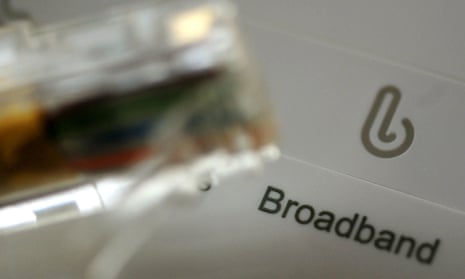More than a million UK homes are unable to get fast enough broadband for modern families’ needs, including watching streaming services such as Netflix and video-calling friends.
Ofcom has revealed that 5% of UK homes and offices, or 1.4m properties, cannot access broadband speeds over 10 megabits per second.
However, the number of homes without 10Mbps broadband has fallen 42% in the past year. In its 2015 report Ofcom found 8% of properties, or 2.4m, were unable to gain access to 10Mbps-plus broadband speeds.
This is the speed the media regulator says is the minimum to meet a typical household’s digital needs, which it says includes film streaming in HD or viewing Amazon and Netflix TV, watching catch-up TV services like the BBC iPlayer, video calling and even basic web browsing.
“Too many people and businesses are still struggling for a good service,” said Steve Unger, group director at Ofcom. “We think that is unacceptable.”
Ofcom’s annual Connected Nations report into the state of the UK’s telecoms and mobile networks did find that there has been a significant year-on-year improvement in enabling the digital “have-nots” to join the high-speed broadband revolution.
The digital and culture minister, Matt Hancock, said: “We have made good progress but more needs to be done to help make sure we build a country that works for everyone. We are driving up mobile coverage and the Universal Service Obligation we are taking through parliament, alongside the £1bn for full fibre and 5G in the autumn statement will do exactly this, by further boosting mobile coverage and delivering fast, reliable broadband to people struggling with slow speeds.
“High speed broadband and good mobile connectivity are no longer a nice to have but a modern necessity and we will not rest until they are delivered.”
The Internet Service Providers Association, which represents companies including BT, Virgin Media and Sky, said that rolling out faster broadband to all households comes with a significant costs.
“As an industry, we understand the frustrations of those who still receive slow speeds,” said an ISPA spokesman. “Our members have worked hard to reduce the number of premises with speeds of less than 10Mbps. However, reaching the final 5% requires significant additional investment.”
ISPA warned that based on Ofcom research it could cost up to £1.1bn to enable faster speed services to reach all households, which could see household bills rise by £20.
Ofcom’s 2016 report also found that UK consumers are embracing superfast broadband, the proportion of homes with 30Mbps or more internet speed has grown from 27% to 31% year on year.
As a result broadband download speeds have jumped 28% from an average of 29Mbps to 37Mbps.
However, Ofcom painted a mixed picture of the progress on the 4G mobile phone coverage.
On one hand, the proportion of premises that can now receive a 4G mobile signal indoors from all four networks – EE, Vodafone, O2 and Three – has risen from 28% to 72%.
However, availability of 4G coverage geographically across the UK overall remains low.
Many people in rural areas, as well as those travelling by car and train, continue to suffer from poor mobile signals.
Total geographic 4G coverage, where the signal is available from all four operators, is still only available across just over 40% of the UK. This is, at least, up from the 8% recorded in 2015.
For voice calls, across 34% of the UK, largely in rural areas, there is not a signal available from all four operators.
“We’re challenging mobile operators to go beyond built-up areas and provide coverage across the UK’s countryside and transport networks,” said Unger.

Comments (…)
Sign in or create your Guardian account to join the discussion